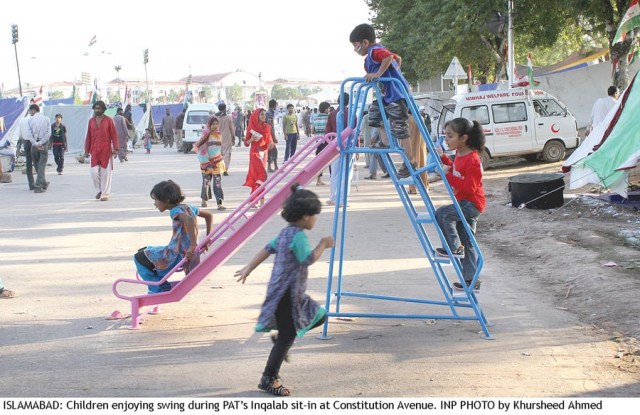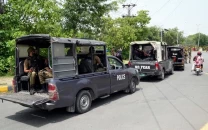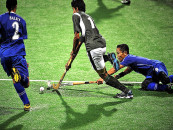Polio drive: Littlest citizens suffer due to grown ups’ apathy
CDA shied from responsibility to vaccinate children at sit in, cites security fears

A three-day nationwide anti-polio drive held in the capital did not include children at the Pakistan Tehreek-e-Insaf and Pakistan Awami Tehreek sit-in.
On the other hand, the Capital Development Authority (CDA) and the Islamabad Capital Administration seem unready or unwilling to take responsibility for vaccinating these children, whose unimmunised status poses a threat to other children in the capital.
A senior CDA official who asked not to be named told The Express Tribune that there is a involved in sending vaccinators to the sit-in site, therefore responsibility for vaccinating children there would lie with the Islamabad Capital Territory (ICT) Administration.
“Our polio teams wouldn’t even dare to enter the sit-in site as they fear that they will face violent resistance from the protesting parties,” said the official.
The official opined that since the ICT is responsible for providing security at Constitution Avenue, it should also carry out the anti-polio drive.
But opinion was undercut by fact when ICT anti-polio drive official Mohammad Kashif was approached for comment.
He said the “ICT is responsible for carrying out anti-polio drives in the suburbs of the capital. The sit-in site comes under the jurisdiction of the CDA, so they are responsible for vaccinate these children.”
He said there was no plan under consideration to shift sit-in vaccination responsibilities to the ICT Administration and no such orders had been issued by any of his superior officers.
Expanded Programme on Immunisation (EPI) National Manager Dr Rana Safdar confirmed that the zone in which the sit-in is taking place falls in the CDA’s jurisdiction, but the civic agency has not shared any plans to carry out an anti-polio drive there.
“It is a fact that the children at the sit-in site pose a threat to other children in the capital who have weak immune systems,” he said.
At national level, he said that areas such as Karachi and the tribal belt, especially areas where military operations are ongoing, remain key challenges for polio workers in terms of accessibility and security.
Sharing the details about the nationwide anti-polio drive started from September 29, he said that during first two days, only 59 per cent of children were vaccinated in the capital, “which is a bit worrying”. The national level rate was a “satisfactory” 68 per cent, he said.
“To make the campaign a success, there is a need to have coverage of over 95%,” said Dr Safdar.
Published in The Express Tribune, October 2nd, 2014.



















COMMENTS
Comments are moderated and generally will be posted if they are on-topic and not abusive.
For more information, please see our Comments FAQ